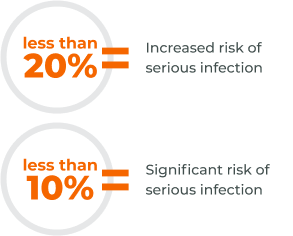Approved Uses and Important Safety Information
What is ACTIMMUNE® (Interferon gamma-1b) used for?
ACTIMMUNE is used to treat chronic granulomatous disease, or CGD. CGD is a genetic disorder, usually diagnosed in childhood, that affects some cells of the immune system and the body’s ability to fight infections effectively.
ACTIMMUNE is also used to slow the worsening of severe, malignant osteopetrosis (SMO). SMO is a genetic disorder that affects normal bone formation and is usually diagnosed in the first few months after birth.
When should I not take ACTIMMUNE?
Do not use ACTIMMUNE if you are allergic to interferon gamma, E. coli-derived products, or any ingredients contained in the product.
What warnings should I know about ACTIMMUNE?
ACTIMMUNE can cause flu-like symptoms. At high doses, the resulting symptoms may worsen some pre-existing heart conditions.
ACTIMMUNE may cause decreased mental status, such as confusion, depression, and hallucinations. It may also cause difficulty walking and dizziness, particularly at high doses. These symptoms usually resolve a few days after reducing the amount of ACTIMMUNE you take, or if you are no longer taking it at all, as prescribed by your doctor.
Use of ACTIMMUNE may affect bone marrow function and may limit the production of cells important to your body. This can be severe and usually goes away after reducing the amount of ACTIMMUNE you take or if you stop taking it entirely as prescribed by your doctor.
Taking ACTIMMUNE may cause reversible changes to your liver function, particularly in patients less than 1 year old. Your doctor should monitor your liver function every 3 months, and monthly in children under 1 year of age.
In rare cases, ACTIMMUNE can cause severe allergic reactions and/or rash. If you experience a serious reaction to ACTIMMUNE, stop taking it immediately and contact your doctor or seek medical help.
What should I tell my healthcare provider?
Be sure to tell your doctor about all the medications you are taking.
Tell your doctor if you:
- are pregnant or plan to become pregnant or plan to nurse
- have a heart condition such as irregular heartbeat, heart failure, or decreased blood flow to your heart
- have a history of seizures or other neurologic disorders
- have, or have had, reduced bone marrow function. Your doctor will monitor these cells with blood tests at the beginning of therapy and every 3 months while you are taking ACTIMMUNE
What are the side effects of ACTIMMUNE?
The most common side effects with ACTIMMUNE are “flu-like” symptoms such as fever, headache, chills, muscle pain, or fatigue, which may decrease the longer you take ACTIMMUNE. Taking ACTIMMUNE at bedtime may help with these symptoms, and acetaminophen may help prevent fever and headache.
What other medications might interact with ACTIMMUNE?
Some drugs, like certain chemotherapy drugs, may interact with ACTIMMUNE and could make it more likely that your heart or nervous system could be damaged. Tell your doctor about all the medicines you take.
Avoid taking ACTIMMUNE at the same time as a vaccination.
You are encouraged to report negative side effects of prescription drugs to the FDA. Visit www.fda.gov/safety/medwatch, or call 1-800-FDA-1088.
The risk information provided here is not comprehensive. To learn more, talk about ACTIMMUNE with your health care provider or pharmacist. The FDA-approved product labeling can be found at www.ACTIMMUNE.com or 1-866-479-6742.









